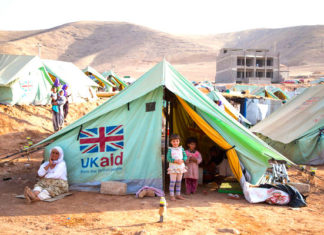
 By Ayomide Anne Ogunleye
By Ayomide Anne Ogunleye
For a while now, Nigerians have condemned on social media the rehabilitation and re-integration of surrendered Boko Haram militants into the society. Many individuals have said that this approach employed by the Buhari-led administration will only embolden terrorism (as you can kill people and surrender, then, be rehabilitated, fed, receive foreign education and be integrated into the society without consequences).
‘Those who have killed mercilessly are being treated like kings while the victims (internally displaced persons and armed forces) are being treated poorly’, many have insinuated through their social media tweets and posts.
But really, is DDR the right approach?
In this article, I elaborate on the concept of disengagement, de-Radicalisation and rehabilitation (DDR) [popularly also referred to as disarmament, demobilization and reintegration in different conflict contexts], and explore various perspectives as to whether it’s the right or wrong approach for suppressing Boko Haram‘s hold on Nigeria.
DDR As a Whole
A de-radicalisation process that lasts for a few months might be totally ineffective in Boko Haram’s case.
DDR is an excellent post-conflict initiative often taken to restore peace into conflict-broken societies. It is a time-tested strategy employed by the United Nations (UN) in its peacekeeping operations; a tool for the restoration of communities after civil wars and other forms of violent conflict. Several peace practitioners and stakeholders have noted that DDR is best employed at the end of a conflict to ensure that militants are strategically re-integrated back into society.
DDR is usually implemented in a post-conflict scenario, i.e. after a conflict has ended, and when a settlement has been reached. However, in Nigeria, it is being initiated as a ‘means to an end’.
Security experts such as Dr. Ona Ekhomu advised that Boko Haram must first be defeated militarily before other conflict resolution strategies can be put in motion. This is because the sect has formed an alliance with the Islamic State in West Africa (ISWAP) and ISIS, and are therefore extremely radicalised and dangerous. Extremely radicalised and dangerous means that a de-radicalisation process that lasts for a few months might be totally ineffective.
The Key Criterion for DDR-Repentance
Before any society embarks onto the path of de-radicalisation and rehabilitation, it must assess and quantify in measurable terms the repentance of conflicting parties. Quantifying in measurable terms could mean the signing of a peace agreement or agreeing to a cease-fire. Without hard evidence of repentance, it‘s almost impossible to determine the level of repentance of these ‘surrendered’ militants–if there‘s any at all.
According to the ‘UN Approach to DDR 2.10’, one of the requirements for DDR to take place is that there must be the signing of a negotiated peace agreement that provides a legal framework. The document further states that the establishment of a DDR process is usually agreed at the ending of hostilities or after a comprehensive peace agreement.
This UN position points that a negotiated peace agreement- which requires repentance and total surrender establishes a strong foundation for DDR processes. This is in contrast to Nigeria’s position as the screening criteria the military employs to differentiate low-risk (repentant) from high-risk (unrepentant and hard-core) is opaque and narrow. It is unclear what criteria the Nigeria military uses to determine who is cleared for rehabilitation, who is kept in detention, or who is informally released. If the criteria are unclear, how can we be sure that the surrendered “terrorists” or militants are truly repentant?
Lessons From Indonesia
The current approach by the Nigerian government to employ DDR is quite commendable because the government, at least, is exploring solutions to put an end to Boko Haram’s hold on Nigeria. However, a critical awareness of the core aspects of radicalisation is important if the aim is to reverse it. The process would include religious teachings by respected and versed Islamic scholars, counselling by experts and mental health experts, and empowerment with technical skills. In addition, the provision of financial aid, at least partly, addresses some underlying key issues of religious extremism, post-traumatic stress disorder, and unemployment.
From 2005-2007, Indonesia employed a supportive de-radicalisation approach like the one mentioned here. Indonesia focused on providing educational and financial assistance while also providing education on countering terrorist ideologies. But the process apparently failed partially as a result of ineffective institutions for regular financial mechanisms, nonchalant attitude of officials, and lack of in-depth counter ideologies procedures.
Final thoughts,
While the Nigerian government has sought and taken the actionable step of DDR to combat terrorism and insurgency, there are a lot more actions to take in order to combat the root causes of terrorism.
First, the government must understand why individuals get radicalised. This is necessary to provide efficient de-radicalisation and holistic societal solutions. The Federal Bureau of Investigation (FBI) has identified that ‘economic, racial, legal, political, religious, familial and social deprivation’ are drivers of acceptance of terrorist ideologies.
In Nigeria, data shows that a large number of individuals, particularly in Northern Nigeria choose to join Boko Haram due to poverty, lack of education, unemployment, the willingness to learn more about Islam, and the knowledge that Nigeria tolerates impunity.
It is therefore pertinent to work together and develop a holistic framework to combat these root causes to put an end to terrorism in Nigeria. It is not enough to focus only on how these persons choose to vent (to arm or not to arm), but also to tackle the underlying concern, the violent approach to matters, a core fundament of radical ideologies.
(Ayomide Ogunleye is the founder of Peace Educator, a platform that teaches non-violent conflict resolution strategies for peaceful inter-personal and community relations. She is passionate about peacebuilding, women empowerment, poverty reduction, and gender equality.)










